250: I was playing the blues, but my face was red
Hullo.
A Grim Future (not that one)
2020 vision
Clever boy
Turn-based strategy
Another plug
Answers
Links
Byyyyeeee!!!
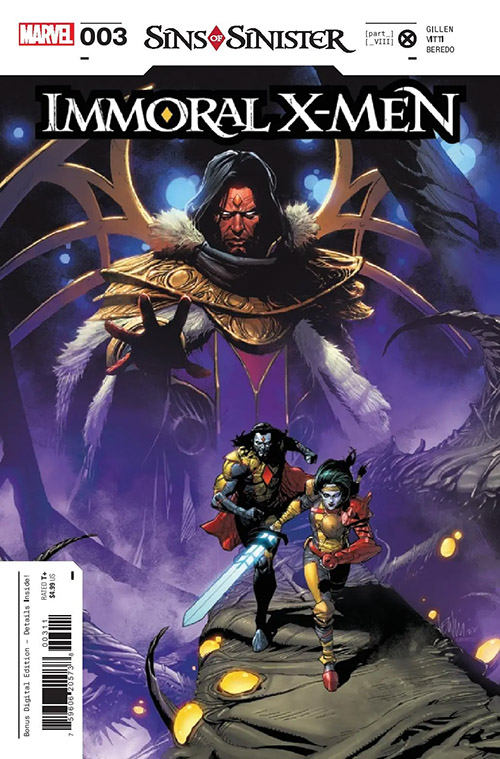
Immoral X-men #3 launches, where Alessandro Vitti launches us into the +1000 period of Sins of Sinister. You saw what happened given 100 years. With 1000 years, it doesn't exactly improve. +10 was our invasion of the bodysnatchers cyberpunk near future, +100 was our shiny space opera period and this is the far future, gothic decadent horror sci-fi future. It's horrible. It's really horrible. We're very proud.
Here's the preview and I'm going to give the first three pages which is a pretty good taste of the somewhat sticky vibe.
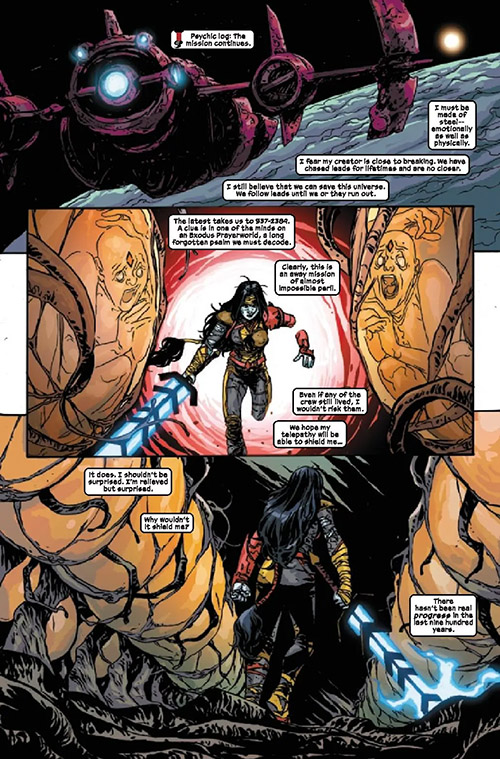
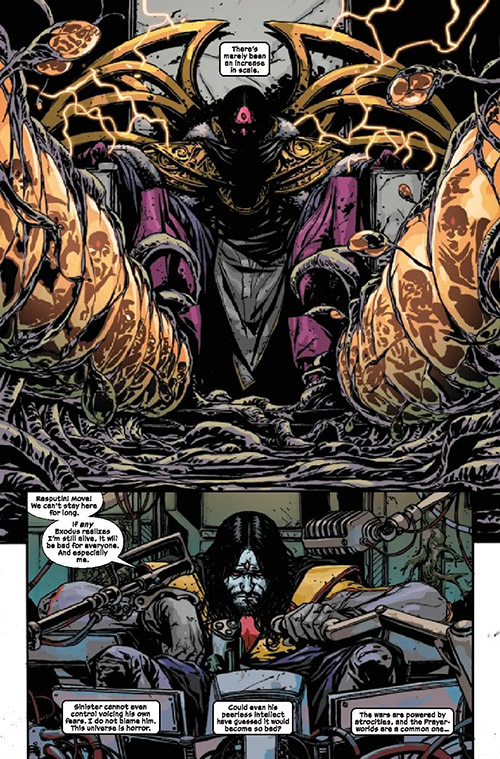
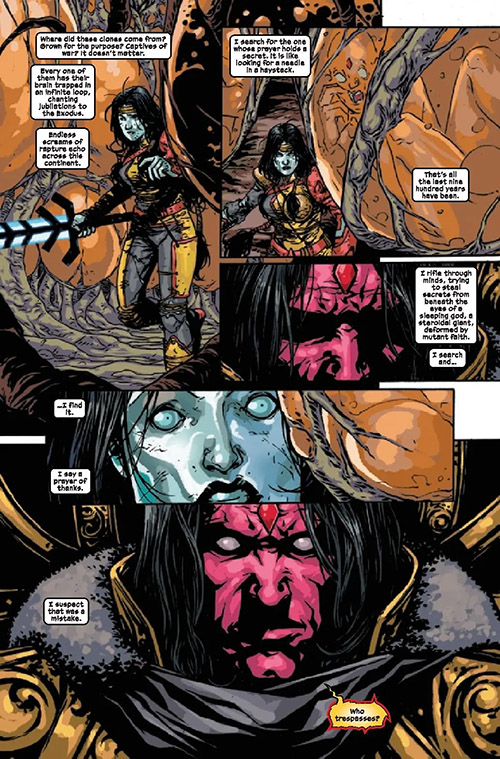
Quite.
Next Week is Al with Storm & The Brotherhood #3, followed by Si on Nightcrawlers #3 before I wrap everything off with Sins of Sinister: Dominion.
This is exciting.
My First Dungeon Presents: DIE
— My First Dungeon (@myfirstdungeon) March 31, 2023
An eight-week podcast event premiering April 7th
Featuring:
🎲 @AtNathanYaffe
🎲 @jacuzzitubbs
🎲 @Drakoniques
🎲 @shenuque
🎲 @ahepwo23
🎲 @mrbrianflaherty
Original Music by @BEHOLDYOURFATE
Interviews with:
@kierongillen @gshowitt pic.twitter.com/qKWgp3tMso
First part launches on Friday, which is an interview with Grant and myself, with the Actual Play kicking off the week after. If you want go see what DIE's like, played by some great players, put together professionally, this is absolutely for you. My First Dungeon is all about introducing new games to folks.
You can sign up on your podcast app of choice here
Also, good news from the latest DIE Kickstarter update...

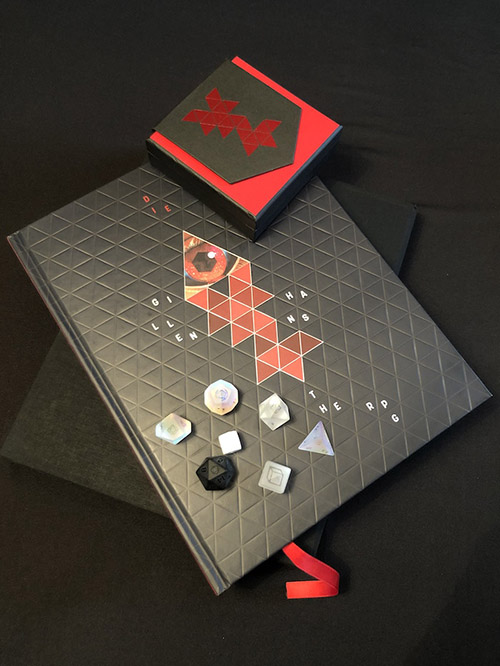

The proofs of both editions have arrived, and are beautiful. The one copy of each is up in Sheffield with RRD, but that they exist is pretty amazing. Unless Grant is lying to me about this, which would also be pretty amazing, but in a different way.
I was asked on Tumblr a question, which I answered

...to which Jamie took as a prompt to actually show the full uncensored sheets for Mother Righteous.
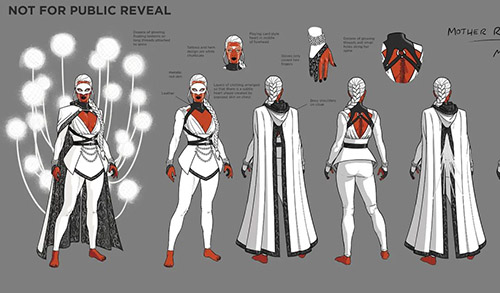
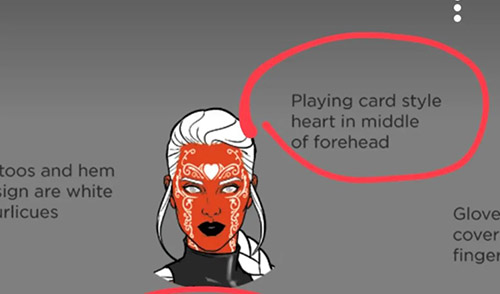
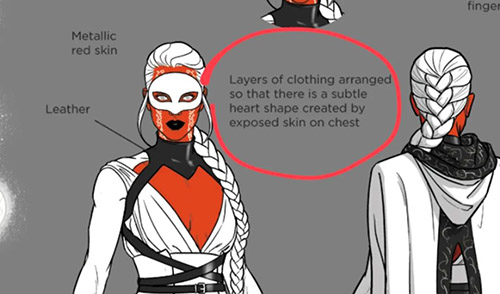
He is annoyingly good sometimes, which sometimes even makes up for all the times he's just annoying.
Actually, since The Sktchd article is the tight compressed article, I could just run my full rambly answers here. So I will. Content!
From a writing and storytelling standpoint, what's the impact of a page turn? How can that enhance a comic reading and writing experience, in your opinion?
If I ever got around to writing my overwritten book about comic writing, I could probably get a chapter from page turns. In the printed medium, they're just one of the fundamentals. Not first rank fundamental, but certainly second rank.
You talk about the upside, but there's also the downside to consider. That's where the power comes from, but it's also a problem to overcome. A page turn is where a reader is taken out of the narrative for a second. They have to move from just using their eyes to also using their hands, and have a gap in the story experience. This is true between panels, but the gap on a page turn is biggest of all. As such, you at least at least consider making sure that you create enough narrative propulsion to carry someone across the gap. Linking captions, teased reveals, whatever. These are all pretty common tactics.
The upside is the flip: every 2 pages, you get to conceal information from the reader. In a visual medium where a reader can see both ahead and behind of their present moment simultaneously means that they are always aware (at least partially) of the information on any spread. The page turn is the magic moment when you get to surprise someone. Whether for comedy, horror, drama, whatever - you have a big beat, it'll likely land harder on a page turn. Hell, more so - it actively undermines a major beat if it's not on the page turn. If you know a character is killed out the corner of your eye, all the tension before that action on the previous page is ruined.
How do you personally like to use page turns?
I try to maximise all of the above, though I'm a lot less regimented about it than I was when I started. When I started, I'd plan the whole issue tightly to make sure every beat I wanted hit on a page turn. Now, I write much more loosely - in a 20 page issue. I know which pages in a scene will be a page turn, just by how close they are from the start or the end, so I'm always aware of them. However, I actually just write all the scenes in an outline form, and then output the script to see where the page turns have fell naturally.
(In Scrivener, page numbers are only filled in when you output)
I then work out what I actually need to do to make the big beats land where I want. Then, as there's usually so many big beats, it's a question of picking and choosing what really matters. If they're all out of whack by one, I'll compress a scene earlier, or expand one to push the whole issue along more. If there's two which are by each other, I'll work out whether it's worth inserting a page, or whether that will lead to the scene being flabby, and you'd be better just powering through - in which case which is the beat which needs to be on a page turn to work, and which one can live with being on the odd page numbering.
Me writing it more loosely is partially born of confidence, in that I've done a lot of comics now and don't think the planning the issue like that is worthwhile, in anything short of a WicDiv formalist showpiece. However it also comes from a recognition that fluidity is important - you tie yourself down mentally earlier to those page turns, it means you're not thinking of what any individual scene is demanding, and forces a lot more work when you're forced to scrap it. I think loose, write the scenes as they want to be in a first draft, and then reconsider, tighten and polish. Normally when I realise that the 20 page issue is 25 pages.
I think of how they'll appear in the trade rather than the single issue (at least, in books with adverts) because that's mainly out of your control, and even if I'm told, I'm not sure they won't shift. In reality, adding advertisments to a single issue actually increases the number of page turns, and so increases the number of reveals, if you see what I mean. If you really want to force a page turn, there's always the trick I learned from Fraction and I think he got from Bendis - you make a page which works across a double page spread, which guarantees the next page will be a page turn.
A splash is almost always a waste of time unless it's a page turn. However, a good page turn doesn't have to be a splash - you can do a huge beat with just a line of dialogue and the right image. I think probably the page turn which got the biggest gasp in my career was issue 11 of WicDiv. End of the page is Laura, now Persephone, singing for the first time in profile. Page turn. We pan to the right, and see Ananke's fingers are behind her head, ready to click and kill her.
On a lower level, just to help people turn the page in excitement, I use "Someone speaks from off panel" before the page turn, with the page turn revealing who's speaking a lot. I am not alone in this.
In terms of the downside, I tend to think what I describe above - you need something to carry people across the page turn - has been overcorrected against in a bunch of work at the moment. You see a lot of connecting captions which cut a line on the previous page and put the other half of it over the page turn (likely in a different scene) to try and carry people across the gap. Unless you've made sure there's some Alan-Moore-y thematic connection or link between the scene, all this really does is ruin that final line, meaning the previous scene doesn't have closure. Some lines that doesn't matter in - they're connective tissue. Hating to use a cinema metaphor: if you've got an actual line worth a damn, let your actors say it instead of using it as voiceover.

Another plug for this, I think, as I'm not doing as many Newsletters at the mo.
Basically, I'm doing my Comics Writing masterclass on Tuesday 6 June 2023, 6pm–8.30pm BST. It's online, and you'll have access to a recording to watch if you can't make it. You can buy tickets here.
I also have answered a bunch of asks on the tumblr. Do ask more if you have anything– it's probably the best way to actually just ask me a question. Here's some of the more interesting to a broader audience ones...
You've mentioned that you wanted to go back to primarily wfh for a little while due to LifeStuff and WorldStuff, and also that your writing is now well into the second half of your Immortal run.
Does this mean you're now starting to pivot back to creator-owned work, can we expect some more Marvel/other wfh, or is it still very much Wait And See?
I'm looking forward to whatever it may be, anyway!
You'd be correct.
I don't see a huge amount of comics WFH after I finish Immortal. Never say never, obv, but I feel a little like I did after I was finishing Young Avengers. As in, the ideas I'm having prompted by where I am don't work at Marvel or a shared universe - I should do my own thing. At least one of the things I'm considering is to Immortal as WicDiv was to YA.
We'll see. I'm not sure if it's all comics, or even mostly comics. You never know - I could just end up writing RPG adventures for a handful of coins. I tend to follow my obsessions. Also, whatever wanders into my line of sight.
I’ve been super loving your writing of Hope in Immortal (and Immoral where she is totally bonkers evil and I love her even more). The idea of having the five essentially unionise via her is genius and besides Sinister, she’s probably the biggest through-line between your 2010s X-work and the current stuff. I was wondering what exactly made you want to revisit her in this new context?
Thank you.
I obviously can't talk about everything until something is over, but one of my first thoughts when going through all of the comics in my preparation was "Hope's been very nice for all of the Krakoan age. Hmm. That doesn't sound like a situation that can last."
The Five are the backbone of Krakoa. Without them, it doesn't work. That they were mostly passive struck me as odd - they have real power. What happens if they start demanding it?
(For that, you choose one person to speak for it - and Hope's the main candidate, for various reasons.)
After that core observation, the rest built. The age/youth stuff is fun for Hope specifically. The exploitation/use of a woman's gifts to fulfil someone else's plans (Compared/contrast with Sinister and Moira). How she and Exodus' mutual history rubbed up against one another, etc. Lots more.
She's just a really abrasive voice, which is also fun.
How involved with the creation of Orbis Stellaris, Doctor Stasis and Mother Righteous were you? Given that they all debuted in other books but tie so closely to Sins of Sinister and your Immortal arc, I'm curious as to whether Jonathan Hickman set them up, or you/Al/Si/Gerry came up with their roles and connections.
Stasis was Gerry's plot. Si suggested that there clearly should be 4 Sinisters. The writer who debuted each Sinister was their primary architect - Al for Orbis, Si for Mother.
I'm really not sure of the exact providence of the structure beneath them - Magic, Mutant, Cosmic, Magic. Gerry gave the first piece with Stasis always being conceived as a Sinister who uses human-derived stuff in the same way that Sinister exploits mutants. I think suggesting the other two may have been me, but It was also something that was talked a bunch in the room. I was the one who did most the writing on the connections - as you say, Immortal is the connective tissue of all of this, with issue 8 as the rosetta stone.
Jon didn't generate any of this, though he was the one to suggest doing Sins as an event, building off where I left things at the end of Immortal's first year.
Apologies if I've got any of the above wrong. Don't trust me.
I am re-reading Uber Invasion, and as a Frenchie I was wondering:
How common was/is it for British people to use the word “Colonials” to refer to USA citizens?
Is tea in the USA that terrible?
It's not something anyone would ever say with any seriousness, or commoness. The joke is that it's archaic and not used often.
It's perfectly possible to get great Tea in America, but basic functional tea is just not as easily accessible. It's just not a tea country.
A British hotel room will almost always have a kettle in. A US one likely won't. Forget quality of the bag. You go into an average diner, and you won't get actually boiling water.
I reference this classic for further information.
- I'm a keynote speaker at the TAGG summit. As in, the Therapeutic + Applied Geek + Gaming Summit. It's on the weekend of April 21st, and I'm speaking on the Friday night (I believe). My keynote is "The Stories we Tell: Freedom and Fear inside the Magic Circle". What does that mean? Fill in your own sweating emoji in here.
- You all know about the majesty of the Majestic toilets, right? When I was in them last Tbubz, I said to Chris Mole that there should be an anthology of stories set there. Chris is absolutely doing it. Submissions are now open. Oh my. Actual submission form here.
- Suzanne Heywood writes about her childhood where she went around the world indefinitely on a boat by her Captain-Cook-chasing parents. Real horrorshow stuff. I'm not quite sure why wanting your children to be happy is so difficult for some people, yet here we are.
- Teeth is coming and now has its Kickstarter page up for “contact me when this is announced” thrills! Jim and Marsh's RPG is basically Jane Austen's STALKER, and I've followed its development with real enthusiasm and can't wait to get hold of a final copy. If you want a taste, here's me running a one-off of the first Teeth zine-release, Night of the Hogmen.
- Al's newsletter is great, but I'm especially enjoying his deep dives into single panels from Marvel Continuity. Here he's delving into the 4th panel of the Marvel Universe, and the creeping horror of the synthetic man.
- From the Al we love to the AI that has come to destroy us all. James Bridle on the current wave of AI at the Guardian. I have half a mind to write something specifically about AI and comics, because I've actually been nosing at the available tools and what they do, and what one can actually do with them to a degree I suspect is a little more than most creators. Go have a nose at the relatively recent ControlNet. For a taste of panic for colorists, skip to the unreleased Anime-line-drawing model.
I'm into music again.
I don't mean that I ever stopped listening to music. I mean that I'm actively engaging with music in a way which I haven't done since my early twenties. I'm making it again.
Like most things, this is born of Iris. C plays pretty good piano, and she has a keyboard in the living room. Iris likes it to be turned on so she can hammer the keys, making a credible horror movie soundtrack. That I'm sitting there with her as she plonks away, has made me just start to join in. Being me, that's got me thinking about the process, asking questions and just trying to see what one can do easily. These are basically the big, fundamental questions you think of when approaching an instrument. Which note is which? How do the chords actually work? How do you play the Tetris theme?
I played bass guitar and Tuba (yes, there's a story there), so I'm not exactly starting from nothing, but I've always been afraid of the keyboard. I've no aptitude for the drums either, as I'm crap at doing two separate things at once. It's never clicked for me. But I found myself thinking... well, Kieron, you can touchtype like few people you know. You're doing something with your two hands separately right now. Maybe you're underestimating yourself. They are both called “keyboards”, right?
(It's not quite the same thing – typing is a single idea, expressed through both hands. Playing piano is two ideas in parallel, expressed through both hands. But still.)
Once I'm bashing away, I'm throwing some basic major and minor chords in a sequence, and immediately it's feeling song-like, so I figure – wait, there's that Garageband app on all your mac stuff. Why not bring stuff over and mess about a bit?
So I do, and record something, and C shits her lung when I play it at her. With the ipad mic, she says I sound like one of the teachers from Peanuts. The okay-ish podcast mic I have on my PC is bust, so I figure I should buy a new one. And I also figure I'm into this enough to buy a small midi-keyboard, just for fucking around. And lo, I fuck around.
At the same time, I hit a podcast lull – I'm up to date on everything I really care about, and some podcast I was trying out hit a point where I decide that they're not for me. As such, I turn to one thing that's been in my backlog for a while, and figure now is the time to actually start.
It's Andrew Hickey's history of rock in 500 songs I've been putting it off as the early episodes are all the backhistory of rock music, which is both my weak spot and also not necessarily where my primary interest in rock has been. Going through episodes on Jump Bands and whatever felt a little bit like homework, so I put it off.
I listen, and now I'm all in. It's exactly what I needed now – when I'm wrestling with fundamentals of music, I want to walk me through the development of the form of Rock & Roll. More so – in these early episodes, that it is my weak spot is the attraction. There's a lot of stuff I simply don't know, and Hickey's taking me through it – both in terms of the technical side of the music and the people who created it. Heroes and villains, all over the place.
I'm about nine or so episodes in and wonder whether it's too early to back a Patreon, and at that exact moment Hickey takes an aside to talk about Phonogram. The sort of coincidence that feels like magic, which is all what Phonogram is about, so what choice do I have but to throw some coins in its direction. Have a listen, and maybe you will too.
It also feeds directly back into what I'm making. As each song and its development is taken apart, I'm looking at the elements, and wanting to play with them myself. I just recorded an absolutely terrible Inkspots homage. If I can find a few minutes later, I'll do something else.
Chrissy came into the office and saw an open tab on my PC, with the chords for Belle & Sebastian's Stars of Track & Field on it and asked: are you doing anything that isn't music at the moment? Well, a newsletter about music, maybe?
Of course, one could see this as pure mid-life crisis stuff. That's fine. It's a damn sight healthier than most options. My loves are all cheap. I'm under no delusions that this is anything but something for myself and perhaps people close to me... but this also comes back to my zinekid background. In an argument I first saw posed in this way in Joy Press/Simon Reynolds' Sex Revolts in their chapter on Riot Grrl: that zine-centric culture believes it's better to create any music (no matter how bad and derivative) than to listen to any music (no matter how excellent). Being able to create is a good thing for yourself – be it a zine, music, comics, whatever.
I don't agree with the argument in its fullest sense, but I do believe the the power you unlock in yourself by just doing something cannot be underestimated.
The highlight so far isn't actually a recording, but a performance.
There was a big marvel zoom call this week. 50+ people on the call.
Gerry is presenting something. The keyboard has just arrived, and with ADHD-restlessness, I'm using it as my fidget tool to help me concentrate, playing the simplest blues-scale walking bassline, up and down, up and down.
Gerry pauses.
“Hey – is someone playing me off?”
I didn't realise I wasn't muted, and I was playing that most sarcastic of keyboard noises to his plans for his future books.
Oh god. Much laughter, much apologies. I was playing the blues, but my face was red.
Speak soon.
Kieron Gillen
London.
5.4.2023